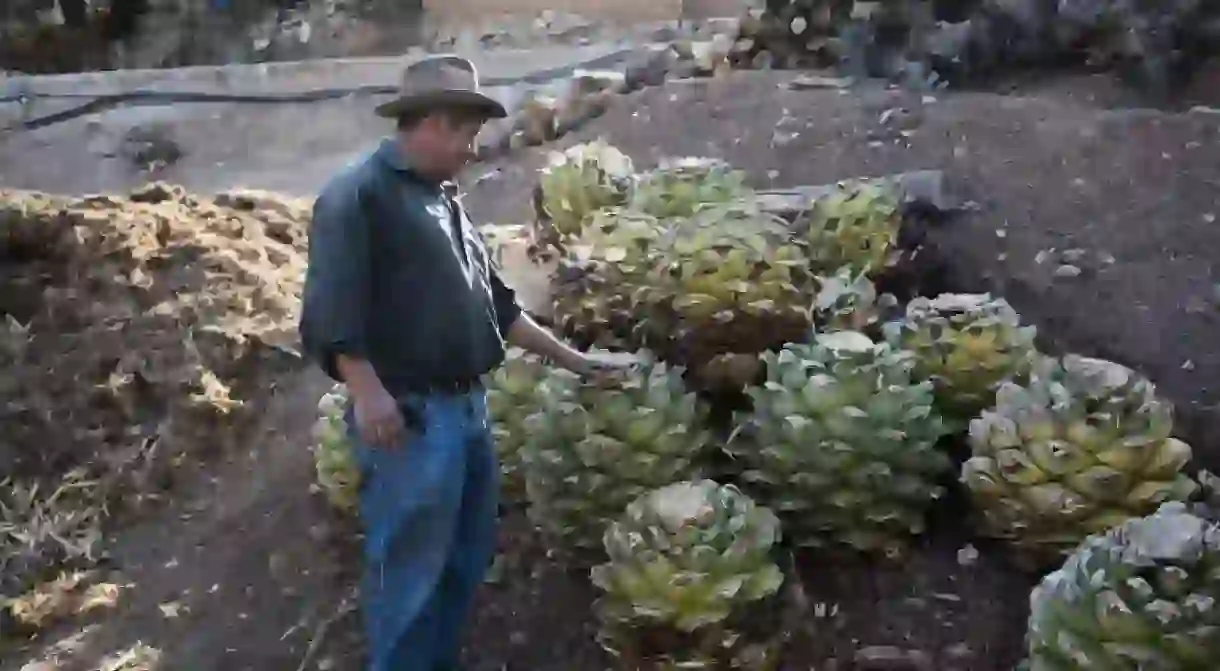Oaxaca's Mezcal, a Labor of Love

At first glance, Alberto Martinez looks like any other middle-aged man whose deep wrinkles and sun-kissed hands tell of a life marked by struggle, hard work and passion.
Alberto is a native of Oaxaca, a state in Southwest Mexico that is regaled for its cuisine and indigenous culture. Located 300 miles south of Mexico City, I find Alberto a mere 15 minutes shy of Hierve el Agua, one of the area’s main natural attractions celebrated for its spring pools and uniquely petrified waterfalls.
When I first see Alberto, he is standing on the side of a dusty, ochre-colored road in a ‘blink-and-you’ll-miss-it’ town made up of painted clapboard houses. On either side of the road stretches rows of sharp, fern looking plants that I later come to learn are the agave used for making mezcal, unique to the Oaxaca region.
Mezcal is often mistaken for its more popular cousin, tequila. Both liquors are derived from the heart of the agave plant—known as the piña—but it is in the production process the nuances between the two drinks stand out. For starters, when making tequila, the piñas are typically baked in steam ovens and mechanically shredded. Mezcal takes on more of a natural approach to its production as I quickly learn from Alberto.

Even from a geographical standpoint, the two drinks differ. Much as authentic champagne must hail from the Champagne region of France, so too does tequila come from Jalisco (the hometown of tequila), while certified mezcal comes from Oaxaca.
In recent years, mezcal has skyrocketed in popularity. The market for mezcal has become saturated with growers who cut corners to sell to tourists, or mezcal enthusiasts who buy in bulk from unknowing farmers than bottle and rebrand the mezcal as their own. The issue is that authentic mezcal takes time to create. The quality of the product is defined by the process of making it; but mass demand threatens the very characteristics that make mezcal desirable.
“Everyone began to see a goldmine in this great new product,” Pedro Jiménez, the owner of Guadalajara’s hip mezcal bar Pare de Sufrir, told The Guardian. “But mezcal isn’t a commodity, it’s a cultural product. There’s no way that you can mass produce mezcal and do it well.”
Alberto’s mezcal seems to sit humbly on the sidelines of the mezcal market wrestling match. Lacking a distributor or even an official brand, Alberto simply enjoys the process of making organic mezcal and doing it right. In order to save enough pesos to purchase his land in Oaxaca, Alberto crossed the United States border five separate times to work on strawberry fields in California. Today, Alberto has been making mezcal for almost a decade.

Wearing worn jeans, a dusty green shirt and a faded cowboy hat, Alberto explains how he produces his quality mezcal from scratch. Once the agave plant flowers, signaling it is ready to be picked, Alberto will then harvest the plants and let them sit for a year until the base of the plant becomes fat and bulbous (otherwise known as maguey). Once the plant is ready, the maguey is burnt for eight days in a manmade oven of piled rocks and wood, which gives mezcal that irresistible smoky flavor it has come to be known by.
The burnt plant is then crushed into a pulp by a mule pulling a stone before it is fermented for up to 15 days and then distilled for 24 hours. When done correctly, the entire traditional process of making mezcal—from the agave plant being picked to the drink touching your lips—can take well over a year.
This is Alberto’s labor of love, he painstakingly makes batch after batch of mezcal by following the traditional steps passed on to him by an elderly friend.
Standing by the large open barrels of fermenting maguey, Alberto pours me a plastic shot glass of mezcal from one of those large containers often seen for transporting gasoline. I take a slow sip and am in awe of how the mezcal is smooth and smoky, complex and fresh. Having tried various types of mezcal back in Oaxaca City, there is a marked difference between Alberto’s organically crafted drink and those served elsewhere.

Alberto’s mezcal was recently granted the coveted seal of certification by Mexico, classifying it as an official mezcal, which is the same as a bottle of champagne being deemed “officially champagne” by France. Yet without money, employees or distribution, Alberto’s mezcal is sold in glass bottles from his unadvertised ranch in Oaxaca.
Alberto’s mezcal label shows the illustration of a proud fist with the word LIBERAL splashed across it and the words “artistic mezcal by Alberto” printed below. To fill the bottle, Alberto takes me to a dark room filled with wooden barrels of mezcal—some aged others young—and uses a bright yellow funnel to pour the liquid before sealing the bottle with wax.

There is a saying in Mexico about mezcal that goes:”Para todo mal, mezcal, y para todo bien, también.” The literal translation of the proverb goes: for everything bad, mezcal and for everything good, mezcal too. Mezcal is a tradition in this country, a drink that welcomes births, celebrates life and honors the dead.
It is not a drink to be tossed back in a drunken blur of mixed drinks, but rather a taste to savor. I drive away from Alberto and his side-of-the-road mezcaleria, watching as clouds of dust swirl up around the car, wiping the image of Alberto away like a fading dream, leaving only the smoky taste of mezcal on my palette.













